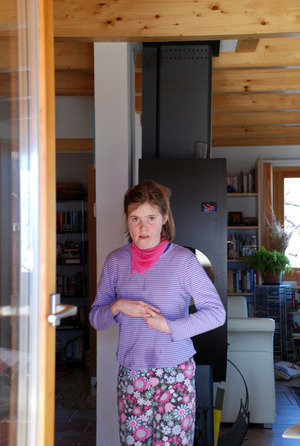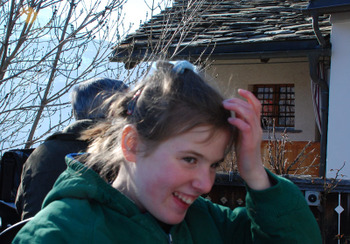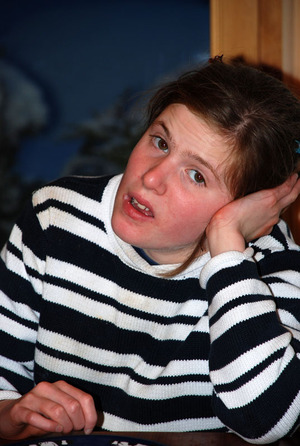
Note: autism and measles vaccinations are words that are much in the news at the moment, and tomorrow GenevaLunch will carry a feature on the MMR vaccinations, autism and the state of the measles epidemic in Switzerland.
Photos: Tara, named for what we think of as the hill of peace in Ireland and after her aunt in Nebraska. A bonus: we also like the richness of centuries of Eastern Tara deities, Buddhist and Hindu.
TODAY is World Autism Awareness Day, the first one ever in a series scheduled by the United Nations "to perpetuity." For once, I feel like this one’s for me and my family – anti-smoking and diabetes and even women’s day: most of the other declared special days don’t touch us the way autism does. We are a family of four, and the youngest, Tara, soon to be 16, is autistic. Like a majority of, but not all, children with autism she has neurological and other health problems, and the autism is probably secondary, a result of these.
The first time I heard the world "autistic" was when I was 24, eating a large bowl of popcorn and drinking wine, sitting around with friends in an apartment in Minneapolis in the US. We were waiting for a BBC programme, picked up by US public television, to come on, but first we watched the end of a programme that showed a screaming autistic child rolling on the floor. "I would die if I had a kid like that," I said.
Decades later, after having a kid like that I can say I’m here to recount the tale, cheerful about life and I still like popcorn and wine. There is a lot to be said for getting older and wiser.
I could recount our whole saga of having a child with major health problems which involve a loss of communication and social skills. Autism is a disorder, not a disease, with many causes. It would take a book, not a web post to describe our journey with it, and it would be different from that of every other family with an autistic child.
 I could go for your sympathy or at least your attention by sharing numbing numbers from Tara’s childhood, so here are a few (we all love sympathy): she had up to 300 epileptic seizures a day for several years, she didn’t walk until she was nearly four. She learned to eat with a spoon when age 8 and a fork at age 10. She gained only one kilo in five years and grew only two centimetres from ages 9-14. Fortunately, just as we considered the difficult business of growth hormones, she began to grow and put on weight.
I could go for your sympathy or at least your attention by sharing numbing numbers from Tara’s childhood, so here are a few (we all love sympathy): she had up to 300 epileptic seizures a day for several years, she didn’t walk until she was nearly four. She learned to eat with a spoon when age 8 and a fork at age 10. She gained only one kilo in five years and grew only two centimetres from ages 9-14. Fortunately, just as we considered the difficult business of growth hormones, she began to grow and put on weight.
She makes a lot of noise but she doesn’t talk. She has found her own ways, and is still finding new ones, to explain what she wants.
I don’t think I could share the number of pills she’s taken to control seizures and vitamins to help her grow or various other things she’s had to take over the years. I’ve lost track.
What I would like to do, for a change, is tell you a little about the delightful if often trying girl who is part of our family. For once, I would like to see her bask in a bit of limelight (her older brother would grumble that she already gets too much attention – there is some truth to this). I rarely write about her because I think she deserves her privacy, like any of us. But today, let’s get her up on the podium for a minute.
She is beautiful, more so than my friends and I were at her age. We
see it because we no longer pay attention to her drooling, a common
problem with children with neurological problems. Other people
sometimes can’t get past the drooling and that’s their loss.
She’s funny and fun, but you have to tune in to her sense of humour,
which is a little odd and involves things like grabbing all the
toothbrushes in the house and running off to hide them while giggling
to let you know. She’s blunt, honest, and doesn’t worry about social
niceties which is, frankly, very refreshing after the world of
business. If you bore her she stands up and walks away. How many times
have we all wished we could do that in a dull meeting?

Tara’s smile stops people in their tracks because it is so uninhibited
and world-encompassing, and they almost always smile right back, first
at her but since she doesn’t pay much attention to them they turn their
smiles on me. Few children can spark that much cheerfulness among
strangers once they get past the age of six months.
She walks on her tiptoes, bites her hand and when she can’t explain
what’s wrong she can have crowd-stopping tantrums that involve stomping
her foot and pulling her hair. She once bit her doctor, possibly the
kindest pediatrician in the world, but he was so gentle in telling her
she must never bite other people that she hasn’t, ever since. Tantrums
are another matter. She had one of those in the middle of a Coop
supermarket trip the other day. We just sit them out and try to
reassure people around us, who are far more upset than Tara and I are.
When she was little I couldn’t leave her alone in the car long
enough to return supermarket trolleys so I just left them around
parking lots without getting back my coins. I consider it my donation
to charity over the years and if you benefited, now you know why.
Tara lives at the extreme edges of the human universe, where she is
either joyful or crying so hard the tears squirt out of her eyes, going
from one to the other state in a flash. For the first nine years of her
life she looked no one in the eye and seemed indifferent to affection.
I never used to take my eyes off her in case I missed the one time she
looked. The day her eyes rested on mine, so briefly I wasn’t sure I was
right, was worth that long wait, even though it was thanks to an
experimental treatment and within a week that window closed again. Now
she seeks me out, tries hard to focus on me and she likes to take my
hand or wrap her arms tightly around me, especially at bedtime, when
her smiles are pure magic.
People are terrified of having a child with health problems,
especially of this sort. My husband and I are for the most part happy
people with a good life and I’m often asked how this can be, given the
burden of Tara. Here are some of the answers.
- When she was little we were exhausted by the combination of
caring for her and endlessly seeking answers, solutions, treatments.
Gradually, what felt like an overwhelming sense of lost hope was
replaced by an appreciation of her progress, tiny as that might have
seemed to other people. She learns, slowly but surely and we now
realize she can go on learning all her life, just like the rest of us.
Where we are too lazy, Tara keeps making the effort, so her learning
curve over time will probably look better than ours. - Tara, like any child, has a personality that has gradually asserted
itself and with time we learned to see this first and the health and
behaviour problems second. She’s alternately sweet, stubborn, easily
bored, impatient with us and quick to flash. Does this sound like any
15-year-olds you know? - She has obliged us to be clear about priorities and to think about
what matters and what doesn’t in life, very useful lessons. Early on I
gave up silk shirts (Tara smears food on me routinely) and nail polish
and I rarely miss them. - While her older brother has had to put up with much, from the way
she fills space to the way she takes more than her share of our time,
he’s also learned to be extraordinarily independent and we’ve had a
good relationship because we learned early to treat him as an adult.

And I am very grateful for one thing, that if we had to have a child
like Tara, we could live in Switzerland, where the system gives us
decent education options, respite care, medical teams we can work with.
It’s not a perfect system and it’s not available to newcomers, which is
a real shame. People with autistic children who are more able than Tara
have more frustrations with the school system. I’ve certainly heard
complaints, but as I comb messages daily in the three online parent
forums I belong to, I wish that more countries, starting with the US,
would study what Switzerland is doing right.
I would not have asked for her to be like this, but that hasn’t
stopped us loving her – nor her loving us. Last week I spoke to her
pediatrician from her early years, whom I haven’t seen for a long time.
He is now the cantonal pediatrician, which I think says much for canton
Vaud because he is wise and kind and open-minded. He told me that he
always felt lucky to work with children like Tara because they let him
look into the very essence of what makes us human. "And does she give
you pleasure?" he asked. "Definitely!" I could answer honestly. "Then
that’s what matters," he said.
So this isn’t about autism or even Tara, after all. It’s about why
we have children, including autistic ones. For sheer pleasure and love.
Practical advice: a list of autism organizations worldwide.

Hello!
I know Tara for one and half year now. She is a wonderful girl and its a real pleasure to share some time with her. She has learnt me a lot of things during those last months and i’m grateful for it!
You talk about Ireland at the very beginning of your article and it makes me think about those lyrics of an irish rock band U2 :
“I want to trip inside your head
Spend the day there
Oh how wonderful – did they write these lyrics for our Tara?! And for the rest of the world, Marie-Anne is one of the wonderful people who works with Tara at her school and while I knew she spoke English, I had no idea she spoke this well! What a treat for Tara, who may not be able to speak, but who is bilingual in comprehension, and I know Marie-Anne sometimes speaks to her in English. Thank you so much for this: I’ll really treasure this song now.